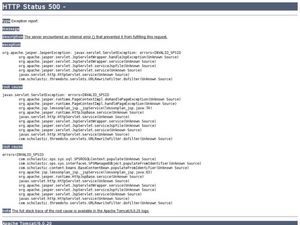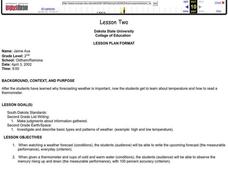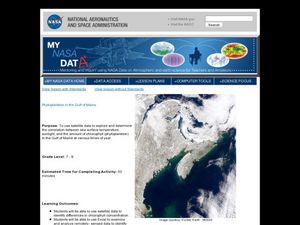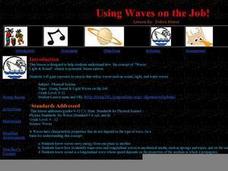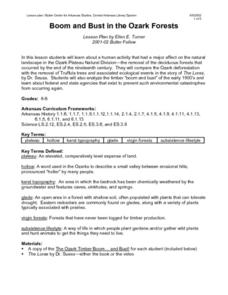Curated OER
Plankton Parade
Plankton isn't just a tiny cartoon character, it's also a very important food source for animals around the world. Budding scientists discuss the types and functions of plankton, including where they are found, how they are caught, and...
National Wildlife Federation
Branching Out – Exploring Dendrochronology
Tree rings from North America give a continuous history of El Nino intensity over the last 1,100 years. Scholars learn how scientists use tree rings to create timelines demonstrating variations in weather patterns. The cumulative...
Curated OER
Spring-Aloud Read
Pupils study the season of spring and create stories about the season. In this spring season lesson plan, students read books about spring and discuss the season. Pupils then color and create a mini-book about Spring.
Curated OER
Weather "Whys" Lesson 4: Spring
Students explore the attributes of spring. In this weather lesson, students collect data regarding weather from various media. Students graph simple weather data and dress animals for forecasted weather. Students discuss the...
Curated OER
Great Balls of Fire
Sixth graders compare and contrast natural and synthetic fabrics. In this science investigation lesson, 6th graders test the flammability of 6 natural and synthetic fabrics.
Curated OER
Lesson Two
Second graders, after assessing why forecasting weather is important, study about temperature and how to read a thermometer. They experiment being able to observe the mercury rising up and down when given a thermometer and cups of cold...
Curated OER
Qualitative Examples of Conservation of Mechanical Energy
Instructions for series of six activites, a reading of scientific literature, and a choice of six assessments await you in this physics resource. Well-written plans guide you in guiding your pupils to experiment with levers, pulleys,...
Teach Engineering
Capturing the Sun's Warmth
Passive solar heating is a technology that's been in use for thousands of years. Here, elementary schoolers are exposed to this type of heating, the materials that are used in passive solar heating, and they study how engineers design...
Curated OER
Simple Machines IV - Wheels and Axles
Youngsters are introduced to the basic principles and uses of the wheel and the axle. They come up with every day examples of simple machines and look into why the wheel and the axle are best-used as a paired machine instead of used...
Curated OER
Simple Machines III - Pulleys
The principles behind pulleys, levers, and simple machines are the focus of a science lesson. In it, learners take part in a whole-class activity. There are two groups of pupils who each must lift objects with fixed pulleys and multiple...
Curated OER
Phytoplankton in the Gulf of Maine
Students use satellite data to see the correlation between sea temperature and sunlight in the Gulf of Maine. In this phytoplankton lesson students use Excel to analyze data.
Curated OER
Using Waves on the Job!
A colorful and comprehensive PowerPoint highlights this lesson on waves. Junior geophysicists pretend that they are hired to analyze seismic waves. A worksheet is provided to go along with an online article about how compact discs work...
Curated OER
Boom and Bust in the Ozark Forests
Here is a hard-hitting, cross-curricular lesson on the effects that the deforestation of the Ozark forests in the 19th century had on the people, animals, and ecosystems of the area. The Dr. Seuss book The Lorax is used as a way of...
Curated OER
Bering Sea Buffet - A Foodweb Activity
Life in the Bering Sea, food webs, and the ocean ecosystem are introduced with a map activity. The lesson starts as kids explore maps and images of the Bering Sea, then it kicks into high gear as they start to discuss the types of...
Curated OER
Wild Horses of the Outer Banks
Young scholars explore animal habitats. In this cross curriculum animal survival and writing lesson, students view a website about wild horses on Shackelford Island and discuss ways in which the horses have changed to this...
Curated OER
The Fabled Maine Winter
Young scholars graph and analyze scientific data. In this research instructional activity students use the Internet to obtain data then draw conclusions about what they found.
California Academy of Science
Earthquakes and Tectonic Plates
Here is a comprehensive package in which middle schoolers learn about types of seismic waves, triangulation, and tectonic plate boundaries. Complete vocabulary, colorful maps, and a worksheet are included via links on the webpage. You...
Illustrative Mathematics
How Many Leaves on a Tree?
This is great go-to activity for those spring or fall days when the weather beckons your geometry class outside. Learners start with a small tree, devising strategies to accurately estimate the leaf count. They must then tackle the...
Polar Trec
Bering Sea Fabulous Food Chain Game
In spring, the Bering Sea turns green due to phytoplankton, which live at the surface, experiencing a population explosion. Groups of scholars play a food chain game, writing down food chains as the game is played. After five to six...
Curated OER
Science: A Tree for All Seasons
Students observe trees in their schoolyard and record the seasonal changes by drawing pictures. In this ongoing lesson, they discover the names of the seasons and place green paper leaves on a paper tree in the classroom, which are also...
Curated OER
Exploring Our Watershed System
Learners study watersheds and examine how they are composed. In this watershed system instructional activity students explain how water enters a watershed and the concept of stream order.
Curated OER
Seasons
Third graders draw a picture. In this seasons lesson plan, 3rd graders name the seasons of the year, discuss what happens during each season, read a poem for each season and draw a picture for each season.
Curated OER
Red Leaf, Yellow Leaf
Pupils discuss the differences between a storybook and an information book. Students use various materials found in nature to make a nature collage. Pupils make a nature dictionary using pictures and their own definitions from the...
Michigan State University
Gases Matter
Young scientists learn that seeing isn't necessarily believing when it comes to the states of matter. After performing a fun class demonstration that models the difference between solids, liquids, and gases, children complete a series of...




